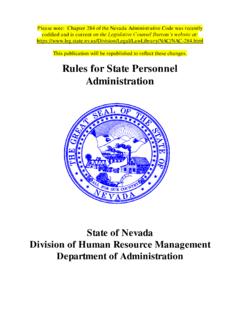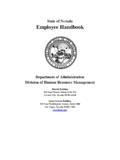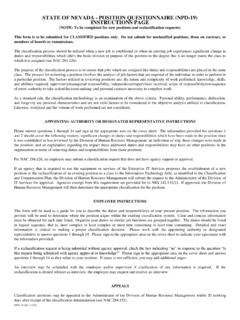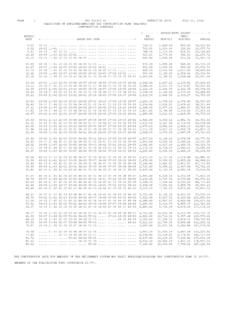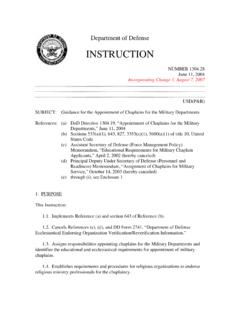Transcription of STATE OF NEVADA
1 STATE OF NEVADA Department of Administration Division of Human Resource Management CLASS SPECIFICATION TITLE GRADE EEO-4 CODE ADMINISTRATIVE ASSISTANT IV 29 F ADMINISTRATIVE ASSISTANT III 27 F ADMINISTRATIVE ASSISTANT II 25 F ADMINISTRATIVE ASSISTANT I 23 F ADMINISTRATIVE AID 21 F SERIES CONCEPT Administrative Assistants perform a broad variety of clerical, secretarial and administrative support duties in an assigned agency, program or other work unit within STATE government and the NEVADA System of Higher Education (NSHE). Typical duties include maintaining records and files; composing and editing correspondence; data entry; office management; budget monitoring and accounts maintenance; typing and word processing; answering telephones and relaying information; reception; duplicating and distributing materials; preparing for meetings and taking minutes; ordering and stocking supplies and equipment; receiving, sorting and delivering mail; reviewing and processing applications, forms and other documents.
2 Operating office equipment such as copiers, personal computers, computer terminals, calculators, facsimile machines, printers, and other equipment; and performing related duties as assigned. Positions allocated to this series may perform the full spectrum of duties described above, or they may specialize in one or more areas of management and program support. The work assigned to positions in this series ranges from basic clerical duties to specialized program support which may include office management. In addition, positions in this series perform many different combinations of duties.
3 Some duties may be performed at several levels within this series. For example, positions at each level in the series may photocopy materials. However, at the lowest level in the series photocopying may represent the preponderance of time, while at the highest level it takes a small percentage of time and is not representative of the complexity of the position s major duties. In this example, there is little difference in the level of complexity associated with photocopying materials. A second example of a duty performed at various levels is scheduling meetings and taking minutes.
4 At the lower levels in the series, this may involve less complex tasks such as notifying staff members of the meeting time and location, making notes regarding decisions reached in the meeting, and preparing simple summaries or verbatim transcriptions. At the higher levels, the duty becomes more complex and may involve arranging travel for individuals from multiple locations, coordinating attendance by internal agency management and external entities, and preparing detailed summaries of meeting discussions and decisions which require specific subject matter knowledge. ALLOCATION OF POSITIONS Allocation of positions to a level within the series is determined by a review of the nature and complexity of work performed; the knowledge, skills and abilities required; independence/supervision received; scope of responsibility/consequence of error; authority to take action/decision-making; and personal contacts necessary to complete work.
5 Employees may be assigned supervisory or leadworker responsibility at any level in the series, but this responsibility does not, by itself, warrant allocation to a higher level. In order to be reallocated from one level in the series to a higher level, a position must spend the preponderance of time performing higher-level duties. Some positions may perform one or two higher level duties, but this does not provide the basis for reallocation to the higher level. The duty statements listed are intended to be representative of the level, but all classification factors must be considered in relation to the duties assigned to a position in order to determine the appropriate classification.
6 ADMINISTRATIVE ASSISTANT IV 29 F ADMINISTRATIVE ASSISTANT III 27 F ADMINISTRATIVE ASSISTANT II 25 F ADMINISTRATIVE ASSISTANT I 23 F ADMINISTRATIVE AID 21 F Page 2 of 13 CLASS CONCEPTS ADMINISTRATIVE ASSISTANT IV: Positions at this level provide secretarial, clerical and administrative support to the administrator of a complex division or the manager of multiple statewide programs, services and activities. Or, they perform specialized duties in support of a program or function which require previous knowledge and experience in the subject area. Assignments are broadly stated in terms of objectives to be met, and/or they are specialized and require the use of analytical and critical thinking to determine appropriate action.
7 Problem resolution often requires research, comparison and examination of detailed agency/program-specific information. Errors directly affect the customized services provided to specific clientele or members of the general public; the content, quality, adequacy and timeliness of services provided; and frequently have monetary consequences to the program or loss of agency credibility. Incumbents interpret and explain complex regulations, laws and program requirements; convince others to take a specific course of action; resolve difficult problems; and defend and justify agency actions to individuals or groups.
8 Critical assignments are reviewed to ensure conformance to standards of quality and general acceptability. Positions at this level may or may not supervise lower level staff. Representative duties for ADMINISTRATIVE ASSISTANT IV include: Act as liaison for the administrator regarding agency activities, operations and programs; coordinate communications with other administrators, agency managers, leaders of external entities, community groups and the general public; relay specialized and sensitive information which impacts division programs and activities; defuse irate callers who insist upon speaking with the administrator; schedule, organize and coordinate meetings, conferences and publicized events.
9 Research and investigate complaints, public inquiries and issues raised by external entities including the legislature and governor s office staff; review and evaluate historical information, precedents and applicable regulations, statute and guidelines; develop alternative courses of action and probable outcomes based on available information and projections for the supervisor s review. Receive, review and evaluate information concerning the eligibility and/or activities of program clientele; interpret and explain program policies, regulations and requirements to individuals who may have opposing viewpoints, varying agendas, and vested personal interests; provide information in a professional manner to individuals who may be confrontational, uncooperative and unpleasant.
10 Perform specialized duties in support of one or more agency programs; implement, coordinate and oversee a major component of a complex program; develop and produce informational materials as requested by the supervisor; ensure program activities conform to established goals and policies; represent the program by participating in ongoing and ad hoc committees and work groups as assigned. Assist professional staff in developing fiscal, operational and procedural program plans by studying historical precedents, present requirements, and projected costs and trends; plan the sequence of detailed steps required to accomplish program objectives; develop, revise and maintain specific procedures and manuals.
